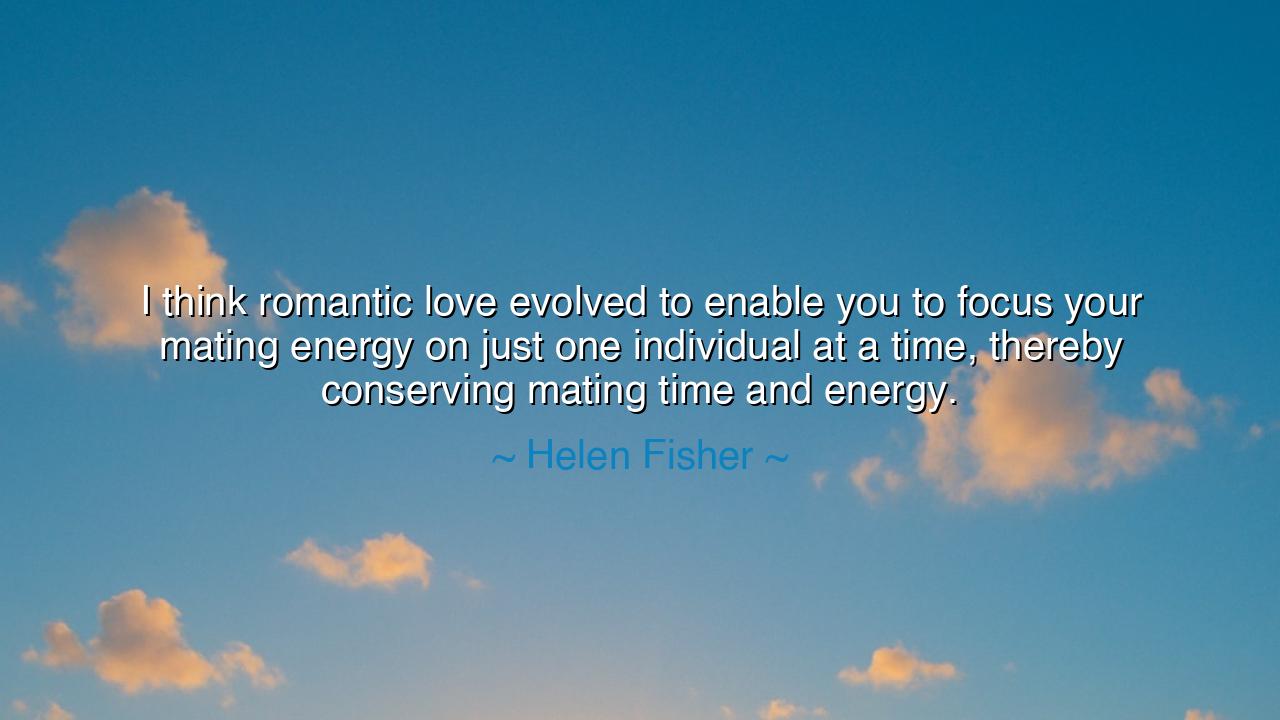
I think romantic love evolved to enable you to focus your mating
I think romantic love evolved to enable you to focus your mating energy on just one individual at a time, thereby conserving mating time and energy.






"I think romantic love evolved to enable you to focus your mating energy on just one individual at a time, thereby conserving mating time and energy." These words by Helen Fisher offer a fascinating perspective on the biological and evolutionary roots of romantic love. Fisher suggests that romantic love is not simply an emotion or a cultural construct, but rather a biological mechanism that helps humans focus their energy on one mate at a time, thereby increasing the chances of successful reproduction and ensuring devotion to a single partner. In this light, love is not just a feeling but a strategy—an evolutionary tool that shapes how we choose, bond, and commit to one another. Romantic love, then, may be viewed as a deep, biological drive designed to maximize the success of mating, all the while conserving precious resources that would otherwise be spread too thin.
The ancient world, though unaware of biological mechanisms, certainly understood the power of love as a force that binds individuals together for the sake of family and tribe. In the Greek mythologies, we see the importance of union between individuals, often celebrated by the gods themselves. Take the union of Zeus and Hera—a partnership that, despite its complexities, was a fundamental force in maintaining the order of the universe. In these myths, the gods themselves embody the principles of devotion, partnership, and focus—values that mirror the biological necessity Fisher speaks of. Zeus’s many liaisons might seem to undermine this, but his central relationship with Hera was one that symbolized the deeper, committed bond that romantic love cultivates in humans.
Consider the story of Paris and Helen of Troy, whose romantic love sparked a war that changed the fate of a city. Their passionate affair became legendary, not because of its selfishness, but because it represented an intense focus of energy—one that resulted in extraordinary consequences. Paris, forsaking all others, focused his mating energy solely on Helen, and in this focus, he created a story that would endure throughout history. The ancient Greeks recognized that love—when directed toward a single individual—can bring about monumental change. Fisher's idea of conserving energy through romantic commitment finds a parallel in this myth. Paris’s devotion to Helen required a concentration of resources, both personal and societal, which ultimately shaped the course of history.
In the modern context, romantic love is often seen as a choice, but Fisher's assertion reminds us that beneath our choices lies an ancient instinct that directs us toward bonding with a single individual. This instinct is not a mere accident of evolution, but a finely-tuned mechanism designed to ensure the continuity of our species. The biological imperative to pair with one partner is reflected not just in human relationships, but in the behaviors of many animals, who, through pair bonding, conserve resources and focus their energy on raising offspring. As Fisher suggests, romantic love is a force that directs our focus and attention toward one partner, facilitating deeper connections that foster stability, trust, and intimacy.
The lesson here, dear listener, is that romantic love serves a higher purpose—a purpose that is intertwined with our very survival and the continuity of our families and communities. Though we may experience love as an emotion, Fisher’s insight encourages us to recognize it as a biological drive—one that focuses our energy on a single individual, binding us to them with such intensity that we are willing to invest in building a life together. Just as ancient societies placed great value on union and devotion, so too must we understand that love is not just a fleeting emotion but a powerful force that shapes the course of our lives and the futures of those we care for.
To those who come after us, remember this: romantic love is both a sacred bond and a natural force. It is not to be taken lightly, for in its focus, in its devotion, there lies the energy that sustains the very fabric of our lives. Let it guide you in your relationships, not only as a source of personal joy but as a tool for building and preserving what matters most: the family, the community, and the legacy you leave behind. Understand the power of commitment, of conserving your resources and energy, and channel it into building something lasting and meaningful, just as the heroes of old focused their strength on the noble causes they believed in.
Thus, let romantic love be more than a fleeting emotion. Recognize its biological roots and the purpose it serves. Channel that focus into your partnerships, nurturing them with the dedication and effort they deserve. In doing so, you will not only enrich your own life but will also contribute to the legacy of love that has endured throughout the ages. Let your heart beat not just for the moment, but for the future you wish to create—a future that is built upon the strength of a single, devoted bond.






AAdministratorAdministrator
Welcome, honored guests. Please leave a comment, we will respond soon